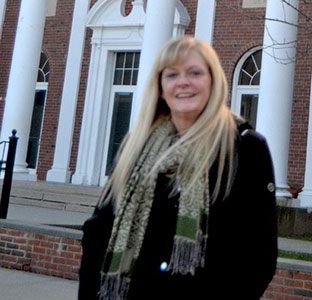Fox-Alter Reflects on Career at Pleasantville Schools

As Pleasantville School District Superintendent Mary Fox-Alter was plowing through countless stacks of files on her office conference table, she was trying to decide what she should keep or discard.
Her official retirement date was still a week away and the decades of files represented hard copies of just some of her institutional knowledge, keys to the previous and current educational landscape.
Fox-Alter has been Pleasantville’s superintendent of schools for 11 years, completing a 32-year tenure in the district. She previously served as the district’s technology coordinator and deputy superintendent before she was tapped to lead the district.
Her college education was a unique blend of courses that would prepare her to steer K-12 education from the 20th into the 21st century, with undergraduate degrees in history and secondary education. She also holds a masters in educational technology. Knowing how to program, she easily connected the dots between technology and education.
“At that time, I wondered why technology was in the realm of just computer scientists and engineers and how it could become an everyday tool needed by everyone,” Fox-Alter said. “If I could bridge both worlds, wouldn’t that serve education?”
Fox-Alter said understanding data is a crucial skill for students to acquire before finishing high school. As the education world embraced the digital universe, Fox-Alter saw it as revolutionary.
“I firmly believe all students, when they graduate, need hard skills and soft skills,” she explained. “Soft skills are liberal arts, creativity, writing, poetry, theater, acting, singing. But you need those hard skills – math and science – to know how technology works and how it impacts your daily life.”
Like any superintendent, Fox-Alter has had her share of challenges throughout her tenure. But none are as impactful as the death of a student.
“Nothing else compares. Whether it’s the loss of a student to a drunk driver, through illness or suicide, you are changed forever by that experience,” she said. “You end up having a deeper respect for the journey of a family and how precious and fragile our experiences are. Aging is a gift not given to all.”
The losses in Pleasantville prompted the school district to take an active role in caring for bereaved students, teachers and families. It demonstrated a need to create a compassionate circle of care consisting of professionals who can support families and students learning how to deal with the different stages of grief, Fox-Alter said.
“I have learned to wake up every day and be appreciative of this community here, the students, my family, my husband and son. That’s what those experiences of loss (have) taught me,” she said.
COVID-19 has been a challenge for school districts adapting to the upheaval of hybrid and remote classes, keeping track of new COVID cases, testing staff and students and the physical reconfiguration of school buildings’ interiors. The pandemic also generated heated and opposing viewpoints on masking and vaccinations. For Fox-Alter, dealing with rising controversies required having a deeper understanding of people.
“The human experience is fragile and we’re hit with so many different challenges right now,” she said. “And sometimes individuals’ ability to absorb all of that and go about their daily lives – there’s only so much capacity in the human spirit. It helps to approach (it) with a level of kindness and recognition, which is always important. It’s even more important now.”
Moving beyond pandemic-induced controversies meant having respectful dialogue.
“It’s the ability to navigate those conversations during difficult periods of time and understand one another in terms of a shared vocabulary,” Fox-Alter explained. “Individuals are trying to improve the quality of life for everyone and people of good intention can accomplish a great deal. Having conversations in a respectful manner, trying to understand perspectives, having warm reactions and cool reactions might be a way.”
During Fox-Alter’s stewardship, the district introduced Dialectical Behavior Therapy (DBT) that teaches students to handle emotions, understand mindfulness and develop interpersonal skills.
“I certainly think what we’ve learned from our DBT skills, our social and emotional contact learning has taught us a great deal about human interaction and how to have those conversations in public over topics where people have different perspectives,” she said.
Explaining how funding for public education works has been one of Fox-Alter’s challenges, especially regarding the tax cap, the limit a district can add to its tax levy from year to year. The tax cap isn’t really understood because “it’s complicated and so murky and that doesn’t help,” she said.
The district has been successful in keeping taxes under control. Fox-Alter said proactive planning for the short and long term rather than reactive planning is essential.
“We need to have a deep understanding of the multiple funding sources,” Fox-Alter said. “Property owners pay an inordinately high level of property taxes and I understand, appreciate and respect that.”
But districts can be hit with state requirements and mandates that drive costs outside of officials’ control, forcing schools to be pressed against the cap.
“You might go to state officials and say ‘Well I’m under the tax cap, but this new cost is here’ and the response we get is ‘Did you go to the limit of your tax cap?’ We say ‘No. I want to stay fiscally responsible to my community.’”
The question Fox-Alter has found herself asking state officials is why should districts max out their tax cap in hopes of getting the state to then pick up the cost of new mandates.
She is a strong proponent of a cost analysis of the impact of new state requirements on schools. There are multiple organizations prepared to do that including the Educational Economic Conference Board, the New York State Council of Superintendents and the New York State School Boards Association.
“We would be more than happy to sit down with anyone and go through what the fiscal impacts of any proposed bill would be,” Fox-Alter said. “That might help people voting on it to understand its potential impact. How do you have a strong debate over a pending bill that could impact schools if the fiscal impact isn’t looked at and discussed.”
Leaving the district in sound fiscal condition while academic excellence has been maintained is reassuring to Fox-Alter. There is also plenty of opportunity for improvement, she said. Integral to growing and improving a school district is the community.
Maintaining all the professional relationships she established when she started as a teacher to when she became superintendent never suggested any change in approach. Rather it emphasized essential teamwork.
“All positions I’ve held had their challenges, joys and rewards,” she said. “However, the one constant is an uncompromising focus on educational excellence, and realizing that it’s a journey. But if you’re on that journey by yourself, you’re not going to go far. If you want to go fast, go alone. If you want to go far, go with a team.”
Fox-Alter is keeping an open mind about her future.
“I’m a faith-based person. I certainly think that God’s not done with me yet. I don’t know what the next journey will be but I am looking at a number of different options and choices. I do know I want to play a role in education in a different way, but a way that clearly advocates for kids.”

Abby is a local journalist who has reported on breaking news for more than 20 years. She currently covers community issues in The Examiner as a full-time reporter and has written for the paper since its inception in 2007. Read more from Abby’s editor-author bio here. Read Abbys’s archived work here: https://www.theexaminernews.com/author/ab-lub2019/


